Looking for a loyal and intelligent companion that will fit seamlessly into your lifestyle? Meet the Dutch Shepherd, a versatile and adaptable breed that could be your perfect match. With its rich history and impressive herding abilities, this medium-sized dog has captured the hearts of many dog enthusiasts.
But that's not all – the Dutch Shepherd also boasts a beautiful coat in a variety of colors and can thrive in different living situations, including apartments. But before you make a decision, there's more to discover about this fascinating breed.
So, are you ready to uncover the intriguing characteristics and traits of the Dutch Shepherd?
Key Takeaways
- Dutch Shepherds are a medium-sized herding breed with a lifespan of 12-15 years.
- They come in various coat lengths and colors, including brindle, gold, and silver.
- Dutch Shepherds can adapt well to apartment living, but consideration for neighbors is important.
- When choosing a dog for an apartment, desirable qualities include being quiet and low-energy, and certain small breeds may not be suitable.
Origin and History
The Dutch Shepherd dog breed has a rich history originating from the Netherlands. These versatile dogs were initially developed as working dogs, specifically for herding sheep and guarding livestock. They've been a part of Dutch agricultural life for centuries, known for their intelligence, loyalty, and versatility.
The breed's origins can be traced back to the late 19th century when local shepherds began selectively breeding their dogs for specific traits. The Dutch Shepherd played a crucial role during World War I and II, serving as messenger dogs, search and rescue dogs, and even as guard dogs.
Today, they continue to excel in various roles, including police and military work, search and rescue operations, agility and obedience competitions, and as loyal family companions. Their rich history and remarkable abilities make them a beloved breed among dog enthusiasts worldwide.
Size and Appearance
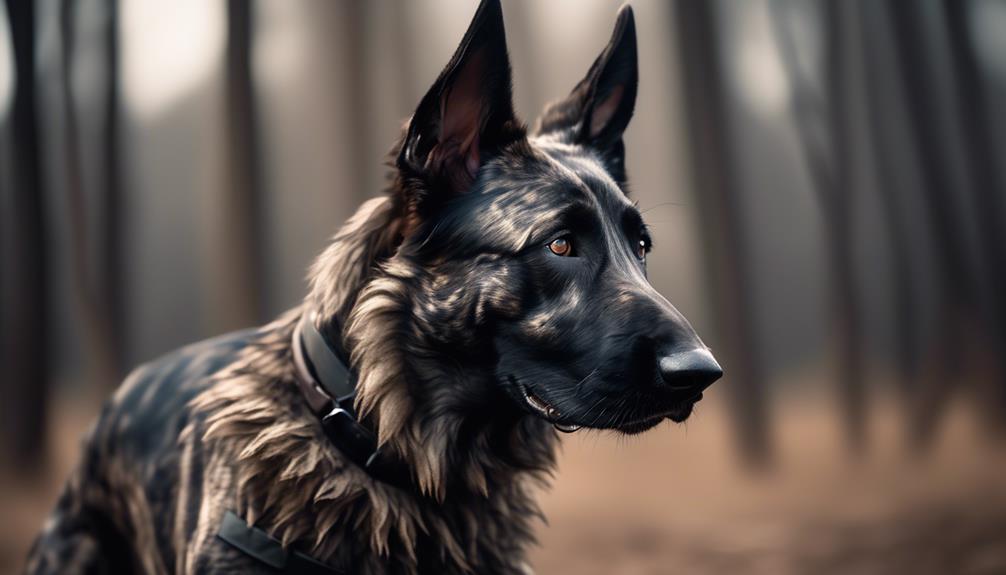
As we move on to discussing the subtopic of 'Size and Appearance', let's now take a closer look at the physical characteristics of the Dutch Shepherd dog breed.
Dutch Shepherds are medium-sized dogs, known for their athletic build and strong, muscular bodies. They have a well-proportioned frame with a deep chest and a straight back.
The breed has a distinctive head shape, with a long, chiseled muzzle and alert, almond-shaped eyes. Their ears are medium-sized and can be either erect or semi-erect.
Dutch Shepherds have a short, dense coat that comes in three different lengths: short, medium, or long. The coat colors can vary and include brindle, gold, or silver.
Temperament and Personality
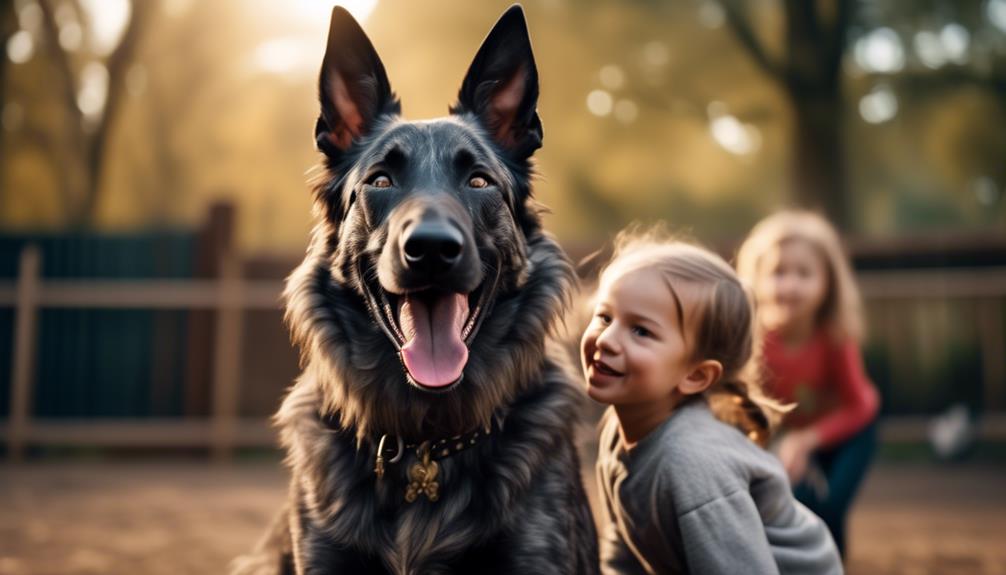
When considering the temperament and personality of the Dutch Shepherd, it's important to note their strong work ethic and intelligence. These dogs are known for their dedication and willingness to work, making them excellent working dogs and companions. They're highly trainable and eager to please, which makes them suitable for various tasks such as herding, tracking, search and rescue, and even therapy work.
Dutch Shepherds are also highly intelligent, which means they require mental stimulation to prevent boredom and destructive behaviors. They're loyal, protective, and make great family pets, but they may be reserved with strangers and require proper socialization from an early age.
Coat Types and Colors
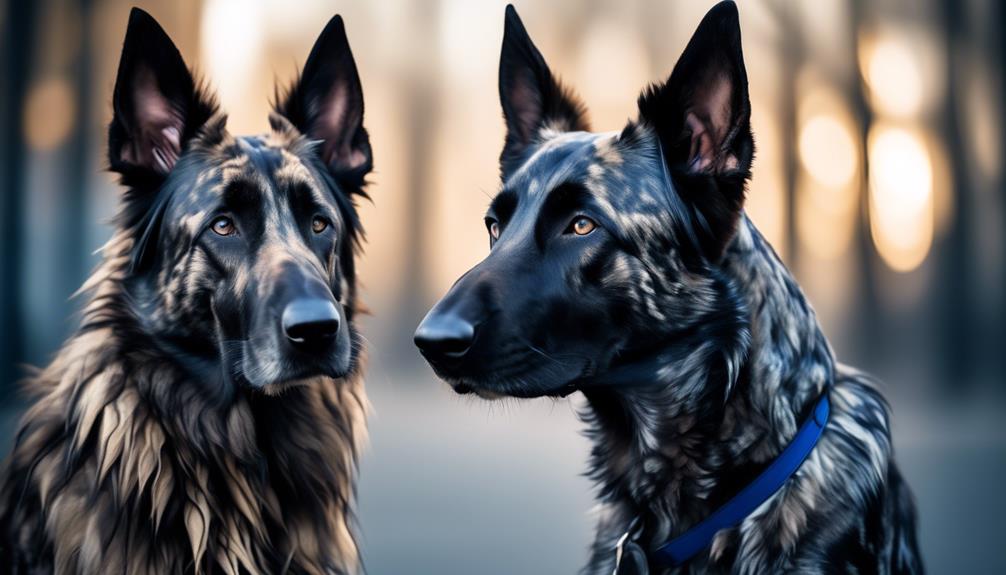
To understand the Dutch Shepherd's coat types and colors, it's important to note the variety and versatility this breed offers.
Dutch Shepherds can have a short, medium, or long coat, each with its own unique characteristics. The short coat is dense and smooth, while the medium coat is slightly longer and may have a slight wave. The long coat is thick and straight, with feathering on the ears, tail, and legs.
In terms of colors, Dutch Shepherds can come in brindle, gold, or silver. Brindle is the most common color, with a mixture of black and brown stripes. Gold can range from light to dark, and silver can appear as a dilute form of the brindle pattern.
The Dutch Shepherd's coat types and colors contribute to its distinctive appearance and make it a visually striking breed.
Exercise and Activity Needs
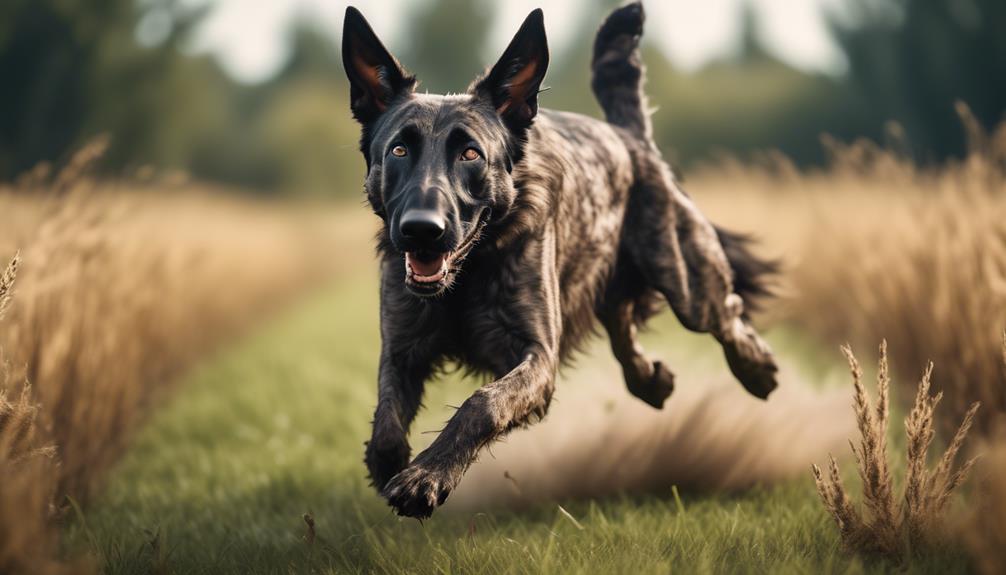
Exercise and activity are crucial for the physical and mental well-being of Dutch Shepherds. These energetic dogs require regular exercise to prevent boredom and destructive behavior. Aim for at least 60 minutes of physical activity daily, which can be divided into multiple sessions.
Dutch Shepherds excel in various activities such as agility, obedience, and herding. They enjoy going on long walks, playing fetch, and participating in dog sports. Mental stimulation is equally important, so consider providing puzzle toys, obedience training, or engaging in scent work.
Dutch Shepherds thrive when given a job to do, so consider activities that tap into their natural herding instincts. Remember to adjust the intensity of exercise based on your dog's age, health, and individual needs.
Regular exercise and mental stimulation will help keep your Dutch Shepherd happy and healthy.
Care and Grooming Requirements
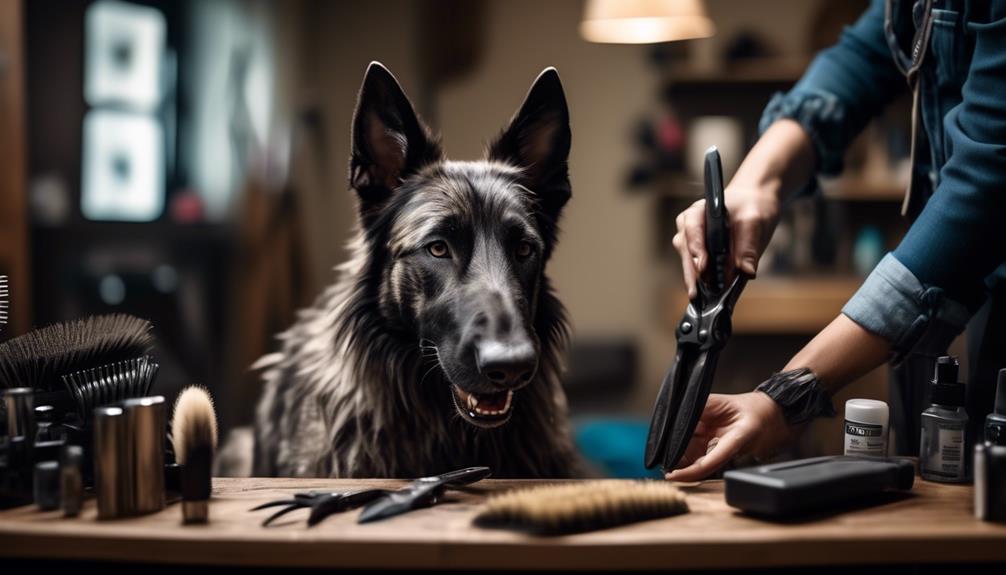
Taking proper care of your Dutch Shepherd's grooming needs is essential for their overall health and well-being. The Dutch Shepherd has a short, medium, or long coat in brindle, gold, or silver. Regular grooming is necessary to keep their coat clean and free from matting. Brushing their coat at least once a week will help remove loose hair and prevent tangles. They're moderate shedders, so regular brushing will also help minimize shedding around your home.
Additionally, their nails should be trimmed regularly to prevent them from becoming too long and causing discomfort. Cleaning their ears and brushing their teeth are also important parts of their grooming routine. It's recommended to consult with a veterinarian or a professional groomer for guidance on the best grooming practices for your Dutch Shepherd.
Compatibility With Children and Other Pets
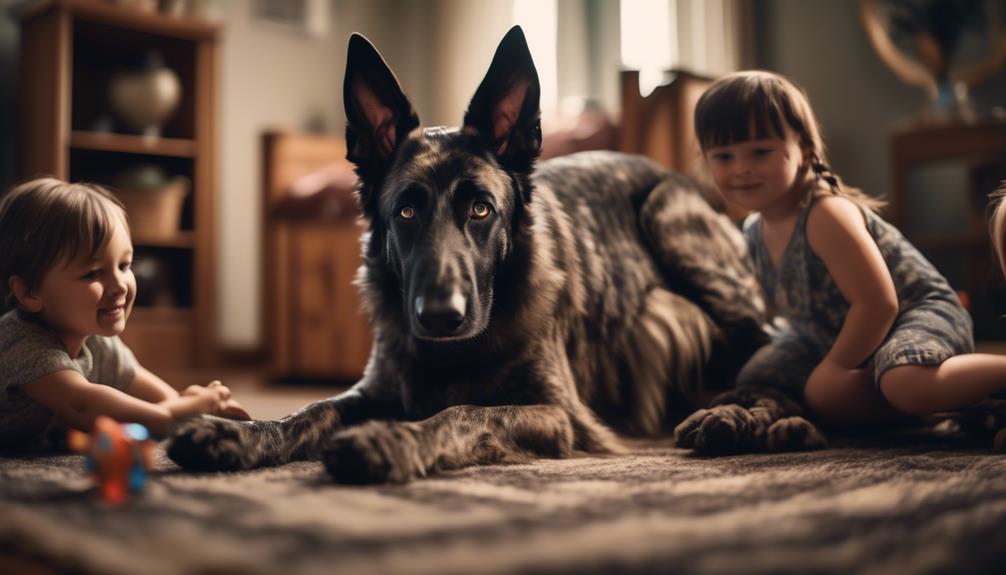
When considering the compatibility of Dutch Shepherds with children and other pets, it is important to note that they are usually good with both, given proper socialization and training. Dutch Shepherds are known for their friendly and affectionate nature, making them great companions for children. They are patient, tolerant, and protective, which makes them a suitable choice for families with kids. Additionally, Dutch Shepherds can get along well with other pets when introduced properly. With their herding background, they may have a natural instinct to chase smaller animals, but early socialization can help minimize this behavior. Here is a table summarizing the compatibility of Dutch Shepherds with children and other pets:
| Children | Other Pets | |
|---|---|---|
| Dutch Shepherd | Usually good | Can get along with proper introduction |
Resources for Dutch Shepherd Owners
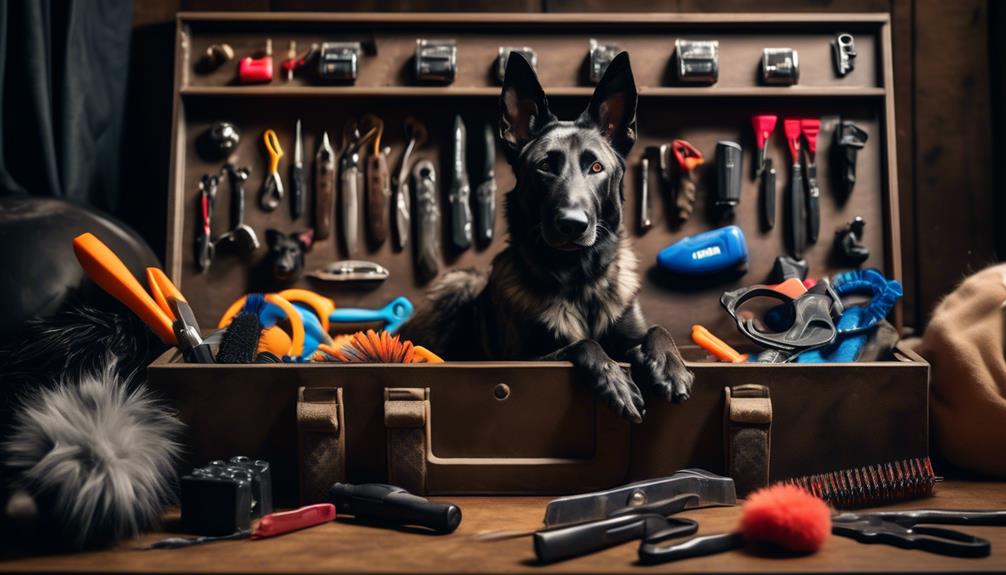
For Dutch Shepherd owners, there are various resources available to provide support and information. These resources can help you better understand and care for your Dutch Shepherd, ensuring a happy and healthy life for your furry friend.
Here are three valuable resources for Dutch Shepherd owners:
- Dutch Shepherd Breed Clubs: Joining a breed club can connect you with other Dutch Shepherd owners who share their experiences, knowledge, and advice. These clubs often organize events, training sessions, and provide access to breed-specific resources.
- Online Forums and Communities: The internet offers numerous online forums and communities dedicated to Dutch Shepherds. These platforms allow you to ask questions, seek advice, and share experiences with other Dutch Shepherd owners from around the world.
- Professional Trainers and Behaviorists: Working with a professional trainer or behaviorist who specializes in Dutch Shepherds can be extremely beneficial. They can provide guidance on training, behavior modification, and help address any specific issues or challenges you may be facing with your Dutch Shepherd.
Frequently Asked Questions
Are Dutch Shepherds Good Guard Dogs?
Yes, Dutch Shepherds are good guard dogs. They are loyal, protective, and have a strong sense of territory. Their intelligence and trainability make them excellent for guarding homes and properties.
How Much Exercise Does a Dutch Shepherd Need?
A Dutch Shepherd needs a significant amount of exercise due to their high energy level. It is important to provide them with regular physical activity and mental stimulation to keep them happy and healthy.
Can Dutch Shepherds Be Left Alone for Long Periods of Time?
Yes, Dutch Shepherds can be left alone for short periods, but they thrive on human companionship and may become anxious if left alone for long periods. They are social dogs that need interaction and mental stimulation.
Are Dutch Shepherds Prone to Any Health Issues?
Yes, Dutch Shepherds can be prone to certain health issues. Some common ones include hip and elbow dysplasia, allergies, and digestive problems. Regular veterinary check-ups and a healthy diet can help prevent and manage these issues.
Are Dutch Shepherds Easy to Train?
Yes, Dutch Shepherds are generally easy to train. They are intelligent and eager to please, making them quick learners. Consistent positive reinforcement and early socialization are crucial for their development.
What Are the Similarities and Differences Between Dutch Shepherd and Collie Dog Breeds?
The Dutch Shepherd and Collie dog breed characteristics have some similarities, such as their intelligence and loyalty. However, they also have differences in their physical appearance and coat types. The Dutch Shepherd is more muscular, while the Collie has a long and luxurious coat, making them distinct from each other.
Conclusion
In conclusion, the Dutch Shepherd is a versatile and beautiful dog breed that's well-suited for various living situations. With their herding abilities and adaptable nature, they can thrive in both rural and urban environments, including apartments.
It's important to note that Dutch Shepherds require regular exercise and mental stimulation to maintain their overall well-being.
An interesting statistic to consider is that Dutch Shepherds have an average lifespan of 12-15 years, providing many years of companionship and love to their owners.




